Visible Leadership
| Our people are our greatest asset. We are committed to supporting and developing staff to ensure they have the skills and training to make a difference in the lives of offenders. |
Supporting our people
Frontline Futures
Attracting and developing the right people to work on our frontline is essential for Corrections to achieve its goals. We know that providing opportunities to gain experience and capabilities in a range of roles makes Corrections, the Justice Sector and the wider public service a more attractive and rewarding place to work. Frontline Futures represents a significant investment in our frontline staff, as a one team training approach for the core roles of corrections officer, probation officer, case manager, employment instructor, and programme facilitator.
We have enhanced our approach to the recruitment and selection of frontline staff. We will focus on promoting careers at Corrections all year round. A new approach to assessment centres has been designed and tested where applicants for all core frontline roles can fully demonstrate their competence through a range of simulated frontline situations. These new frontline assessment centres will soon be implemented nationally. Psychometric tests provide important information for hiring managers and, through Frontline Futures, we will soon have one psychometric assessment for all core frontline roles at no extra cost.
As one of the largest operational government departments, Corrections offers a wide range of career opportunities. A Career Hub is now available to provide in-depth information on available roles and transferable skills, as well as emphasising the value that Corrections places upon gaining experience in different environments. Staff who successfully transition between roles are encouraged to support others who are considering similar moves.
Frontline Start
We now prepare our frontline staff for their new role through the Frontline Start Learning programme, where learning that is common across these roles is delivered on a monthly basis. This includes an introduction to Corrections and the wider public service by the Chief Executive, National Commissioner and representative from the State Services Commission. The programme is heavily focused on integrity and values, the importance of safety and the principles of good decision making.
The Frontline Start Learning programme consists of three, week long learning modules, which create a structure of knowledge for new frontline staff. It aims to give staff a generalised overview of the context and nature of frontline roles, so that practical experience can be mapped onto an appropriate knowledge base. It sits within Frontline Futures as an effort to unify and enhance initial training, and has been developed over the 2014/15 financial year with pilot modules beginning in May 2015.
Developing our leaders
Our focus on leadership development is producing ongoing and positive results. We have continued to set clear expectations for the development, performance and accountability of our staff. Concurrent strategies include the Emerging Senior Leaders and Emerging Regional Leaders programmes, which work to create strong leadership dynamics throughout the organisation. Our annual Leaders Forum brings together emerging senior leaders to share initiatives, and to acknowledge work programmes, teams and individuals that have achieved particular success. Visible Leadership embodies the expectation that managers will be strong and active leaders who inspire their teams. Beyond Corrections, it is about us taking a lead role across the public sector and demonstrating how we can work together to reduce re-offending.
Integrity at Corrections
Integrity means different things to different people and different cultures. It can be informally defined as doing the right thing even when no-one is watching. Integrity takes on added significance within the context of Corrections, as our staff are tasked with managing some of the most challenging people in society and supporting their rehabilitation and reintegration. In this financial year we have worked to strengthen integrity at every level of the department.
Integrity Support Team
The Integrity Support Team (IST) has replaced the Professional Standards Unit, creating a fresh focus that works to strengthen integrity beyond the investigation of specific lapses.
The work of the IST is focused upon five key areas:
- Leadership and culture: driving change from the top down
- Education and prevention: setting clear expectations and standards of behaviour, communicating practical processes and the consequences of non-compliance
- Human resources: ensuring staff accountability, staying in touch with employees through all stages of the employee cycle
- Detection and investigation: impartiality, specialist skills, knowledge and accountability; furthering large scale reviews of unlawful or unethical practice and behaviour
- Continuous improvement and reporting: monitoring our integrity framework through measurement and assessment to ensure objectives remain relevant, and identifying opportunities for learning and improvement.
| Offenders on community work sentences contributed over 2.2 million hours of work in 2014/15 |
| Corrections works wherever possible to give back to our communities |
Strengthening our partnerships to deliver our shared objectives
While offenders are in our care we aim to provide rehabilitative and reintegrative services that will make a difference in their lives. However, to provide the most effective and long term forms of support we need to partner with others who can enhance our strategies and efforts. With this in mind, we work with iwi, community groups and non-government organisations (NGOs), to engage them in the rehabilitative and reintegrative process for offenders.
In 2014/15 we piloted the Te Ihu Waka framework for interventions with Maori offenders, which will be adopted as standard practice from July 2015. Te Ihu Waka is a culturally responsive framework, developed in consultation with providers of our existing tikanga programmes, which uses Maori philosophy, values, knowledge and practices to motivate offenders to address the underlying causes of their behaviour. This framework will enable greater engagement between Corrections, iwi groups and Maori offenders.
Corrections has continued to work with a range of NGOs to provide rehabilitative and reintegrative services. NGOs provide a wide range of support, for example the Prisoner’s Aid and Rehabilitation Society provides general reintegrative services, the Salvation Army and Salisbury Street provide accommodation support, and the Problem Gambling Foundation and Alcoholics Anonymous provide targeted forms of rehabilitation. As well as the services, programmes, and support that NGOs provide, their involvement represents a joint commitment to provide offenders with the rehabilitative and reintegrative support that will allow them to reintegrate into the community and lead a law-abiding lifestyle.
Giving back to the community
Corrections works to improve the lives of all New Zealanders, and wherever possible works to give back to our communities. In this financial year we have worked with the Ministry of Health and Housing NZ to progress the goal of reducing rates of rheumatic fever by two thirds. One cause of this disease is damp houses and storage units, and prisoner employment programmes at Spring Hill Corrections Facility and Whanganui Prison have built healthier houses and furniture to be distributed to families in need. Training and employment in construction has been encouraged at Rolleston Prison, where prisoners are helping to rebuild in the wake of the Canterbury earthquakes. Four community-based offenders from New Plymouth formed part of the team that transformed the Bowl of Brooklands for the WOMAD festival in March 2015.
Offenders on community work sentences completed over 2.2 million hours of community work in 2014/15. Community work parties contributed nearly 500 hours to the clean-up at Whanganui following severe floods in June 2015, which included:
- clearing debris from the play area at Putiki Kohanga Reo on SH3
- clearing mud and silt from the playground equipment, public toilets and Tot Town railway at Kowhai Park
- work at Whanganui Airport to enable trucks to dump silt without damaging fences
- unpacking donations received at a community work agency (Koha Shed).
Our people
The permanent workforce remained steady in 2014/15.
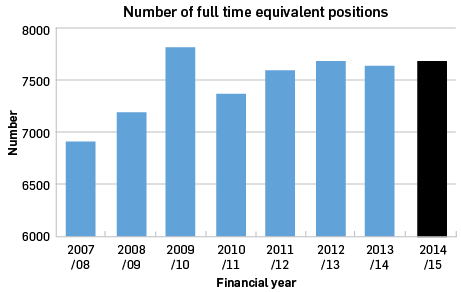
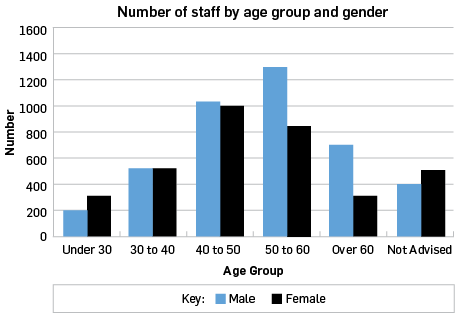
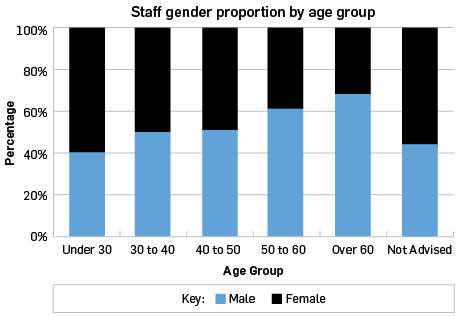
With Maori and Pacific peoples continuing to be over-represented in the corrections system, it is important for Corrections to ensure that its staff represent the full spectrum of the offender population. As with previous years, this level remained high in 2014/15.
More than 20% of staff identified as Maori in 2014/15, and approximately 8% identified themselves as Pacific Peoples. A high number of staff identify themselves as having a multi-ethnic background, and this is reflected in the high level of the other category.2
The average age of our staff is 47.9 years. 54% of Corrections’ staff are male, and 46% are female.
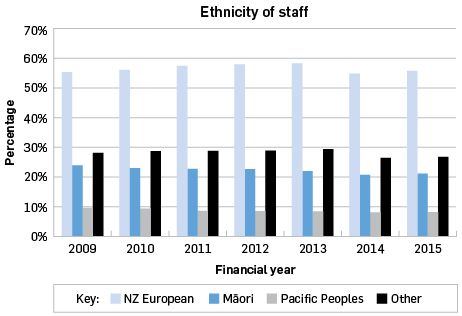
Turnover
Voluntary turnover at Corrections stayed steady at just over 9% in 2014/15, remaining below the public sector average. It has been at or around this level since 2010/11.
Pay equality
The gender pay gap at Corrections continues to be significantly less than the Public Sector average. The most recently reported pay gap was 2% compared to a sector average of 14%, a difference of 12%. This difference has been generally consistent since 2010, with the sector average remaining at 14% and Corrections’ varying between 2% and 1%.
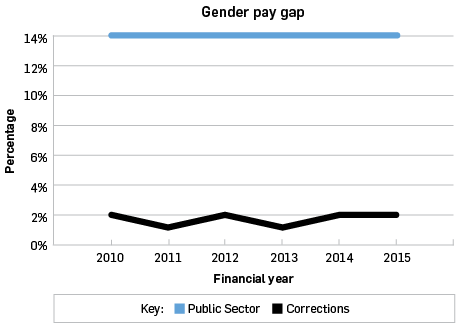
Return to Part A contents page
Return to the main Annual Report 2014/15 page
2 The percentages for each year in the graph will add up to more than 100%, because staff can identify as more than one ethnicity.

